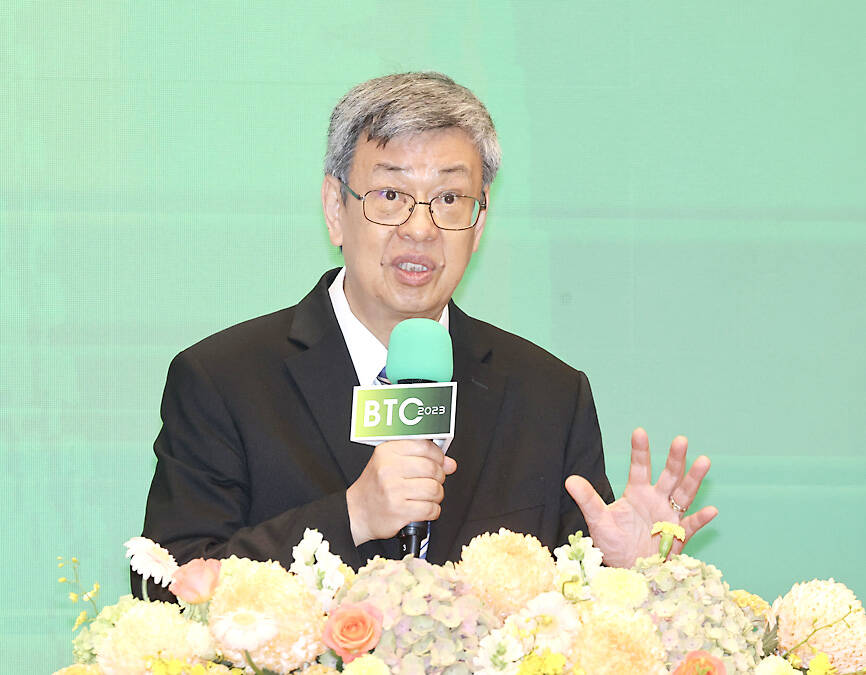Premier Chen Chien-jen (陳建仁) yesterday said the government plans to build the local biotechnology industry into the next sector to generate NT$1 trillion (US$31.37 billion) in production value.
President Tsai Ing-wen (蔡英文) has paid much attention to the development of the local biotech industry since taking office in 2016 and the government is now looking to boost its output to NT$1 trillion, Chen said in his address to the opening ceremony of this year’s Bio Taiwan Committee.
In 2016, the first year of Tsai’s first term, the president launched the “5+2 Industrial Innovation Program” aimed at boosting Taiwan’s competitiveness, which included the biotech industry, Chen said.

Photo: CNA
Tsai also unveiled the “Six Core Strategic Industries” program, which was built on the foundation established by the 5+2 Industrial Innovation Program, to promote precision healthcare as one of the six core industries in the nation, he said.
The Executive Yuan plans to integrate resources across government, to map out appropriate policies and laws to boost the pace at which the nation’s biotech industry grows, he added.
Currently, several industries in Taiwan have posted more than NT$1 trillion in production value, including the semiconductor, Internet communications, server, display, printed circuit board and machinery industries, Chen said.
The government would collect information and opinions from experts at the three-day annual meeting of the Bio Taiwan Committee, which was set up by the Executive Yuan in 2005, as an important reference as the Cabinet seeks to promote biotech development, he said.
Chen said Taiwan has world-class biotech and medical talent who provide excellent healthcare services and enabled the nation to take first place in the global Health Care Index for the fourth consecutive year, indicating that Taiwan’s hospital services and digital medical care are well recognized worldwide.
Referencing Taiwan’s efforts at combating the COVID-19 pandemic over the past three years as an example, he said the success came from the nation’s sound and comprehensive healthcare system, and close cooperation between the public and government.
With its people protected by a good healthcare system, Taiwan boasted one of the best economic performances in the world from 2020 to last year, Chen said.
The government aims to set up biotech industrial clusters by encouraging more start-ups to join the sector and attracting more foreign companies to enter the local market, he said.

Seventy percent of middle and elementary schools now conduct English classes entirely in English, the Ministry of Education said, as it encourages schools nationwide to adopt this practice Minister of Education (MOE) Cheng Ying-yao (鄭英耀) is scheduled to present a report on the government’s bilingual education policy to the Legislative Yuan’s Education and Culture Committee today. The report would outline strategies aimed at expanding access to education, reducing regional disparities and improving talent cultivation. Implementation of bilingual education policies has varied across local governments, occasionally drawing public criticism. For example, some schools have required teachers of non-English subjects to pass English proficiency

‘FORM OF PROTEST’: The German Institute Taipei said it was ‘shocked’ to see Nazi symbolism used in connection with political aims as it condemned the incident Sung Chien-liang (宋建樑), who led efforts to recall Democratic Progressive Party (DPP) Legislator Lee Kun-cheng (李坤城), was released on bail of NT$80,000 yesterday amid an outcry over a Nazi armband he wore to questioning the night before. Sung arrived at the New Taipei City District Prosecutors’ Office for questioning in a recall petition forgery case on Tuesday night wearing a red armband bearing a swastika, carrying a copy of Adolf Hitler’s Mein Kampf and giving a Nazi salute. Sung left the building at 1:15am without the armband and apparently covering the book with a coat. This is a serious international scandal and Chinese

TRADE: The premier pledged safeguards on ‘Made in Taiwan’ labeling, anti-dumping measures and stricter export controls to strengthen its position in trade talks Products labeled “made in Taiwan” must be genuinely made in Taiwan, Premier Cho Jung-tai (卓榮泰) said yesterday, vowing to enforce strict safeguards against “origin laundering” and initiate anti-dumping investigations to prevent China dumping its products in Taiwan. Cho made the remarks in a discussion session with representatives from industries in Kaohsiung. In response to the US government’s recent announcement of “reciprocal” tariffs on its trading partners, President William Lai (賴清德) and Cho last week began a series of consultations with industry leaders nationwide to gather feedback and address concerns. Taiwanese and US officials held a videoconference on Friday evening to discuss the

PERSONAL DATA: The implicated KMT members allegedly compiled their petitions by copying names from party lists without the consent of the people concerned Judicial authorities searched six locations yesterday and questioned six people, including one elderly Chinese Nationalist Party (KMT) member and five KMT Youth League associates, about alleged signature forgery and fraud relating to their recall efforts against two Democratic Progressive Party (DPP) legislators. After launching a probe into alleged signature forgery and related fraud in the KMT’s recall effort, prosecutors received a number of complaints, including about one petition that had 1,748 signatures of voters whose family members said they had already passed away, and also voters who said they did not approve the use of their name, Taipei Deputy Chief Prosecutor